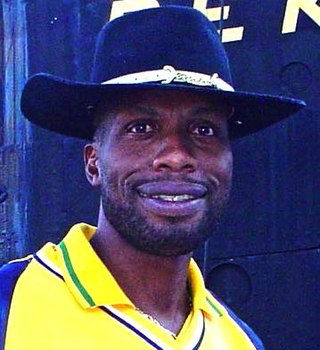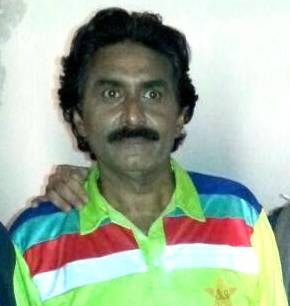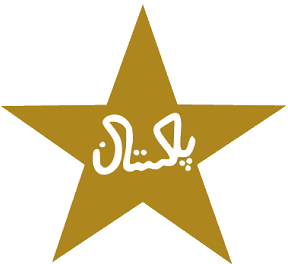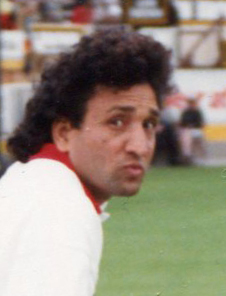
Sir Curtly Elconn Lynwall Ambrose KCN is an Antiguan former cricketer who played 98 Test matches for the West Indies. Widely acknowledged as one of the greatest fast bowlers of all time, he took 405 Test wickets at an average of 20.99 and topped the ICC Player Rankings for much of his career to be rated the best bowler in the world. His great height—he is 6 feet 7 inches (2.01 m) tall—allowed him to make the ball bounce unusually high after he delivered it; allied to his pace and accuracy, it made him a very difficult bowler for batsmen to face. A man of few words during his career, he was notoriously reluctant to speak to journalists. He was chosen as one of the Wisden Cricketers of the Year in 1992; after he retired he was entered into the International Cricket Council Hall of Fame and selected as one of West Indies all-time XI by a panel of experts.

Mohammad Javed Miandad PP SI, popularly known as Javed Miandad, is a Pakistani cricket coach, commentator and former cricketer known for his unconventional style of captaincy and batting. ESPNcricinfo described him as "the greatest batsman Pakistan has ever produced" and his contemporary Ian Chappell extolled him as one of the finest batsmen in the history of cricket.

The Pakistan national cricket team, has represented Pakistan in international cricket since 1952. It is controlled by the Pakistan Cricket Board (PCB), the governing body for cricket in Pakistan, which is a Full Member of the International Cricket Council (ICC). Pakistan compete in cricket tours and tournaments sanctioned by the PCB and other regional or international cricket bodies in Test, One Day International (ODI), and Twenty20 International (T20) formats. Pakistan are current ICC Champions Trophy holders.

Abdul Qadir Khan SI was an international cricketer who bowled leg spin for Pakistan. Abdul Qadir is widely regarded as a legendary leg spinner from the 1970s and 1980s and was a role model for up and coming leg spinners. Later he was a commentator and Chief Selector of the Pakistan Cricket Board, from which he resigned due to differences of opinion with leading Pakistan cricket administrators.
Khizer Hayat is a Pakistani former cricket player and umpire. He played first-class cricket for ten years before taking up umpiring. He officiated in 34 Test matches and 55 One Day International matches.
The Benson and Hedges Challenge was a one-off one-day international cricket tournament played at the WACA Ground in Perth, Western Australia from 30 December 1986 to 7 January 1987 as part of the 1987 America's Cup Festival of Sport.
This article describes the history of cricket in Pakistan from the 1970–71 season to 1984–85.
The Australia national cricket team toured South Africa from February to April 1994 and played a three-match Test series against the South Africa national cricket team. The tour was Australia's first to South Africa since the end of the apartheid regime which had led to a sporting boycott of the country. Australia's most recent tour to South Africa had taken place in 1969–70 and a planned tour of the country in 1971–72 had been cancelled after the International Cricket Conference had imposed a moratorium on tours in 1970 and following the player withdrawals and protests which accompanied the tour of Australia by the South African rugby union side during 1971. The Australian Cricket Board postponed their proposed tour of Sri Lanka in order to schedule the series, paying A$50,000 compensation to the Board of Control for Cricket in Sri Lanka.
The New Zealand national cricket team toured South Africa from November 1994 to January 1995 and played a three-match Test series against the South Africa national cricket team. The tour was the third time that New Zealand had visited South Africa and their first tour to the country since the end of the apartheid regime which had led to a sporting boycott of South Africa. South Africa won the Test series 2–1, despite New Zealand having won the first match of the series - the first time that a side had lost a three-match series after having led since 1888 when Australia had lost against England. New Zealand also competed in the Mandela Trophy with South Africa, Sri Lanka and Pakistan but were eliminated in the group stage, not winning any of their matches.
The Australian cricket team toured Pakistan in 1994–95. The teams played three 5-day tests and took part in a triangular ODI series. Pakistan won the test series 1 - 0. Shane Warne was declared Man of the Series. Australia won the Wills Triangular Series, beating Pakistan in the final.
The Pakistani cricket team toured England in the 1992 English cricket season, the first tour since the acrimonious visit by England to Pakistan in 1987/88, which was highlighted by the Mike Gatting/Shakoor Rana dispute. Five Test matches and five One Day Internationals were scheduled, running from May to August.
The Pakistan national cricket team toured New Zealand in the 1988–89 season, following its unsuccessful participation in the Benson and Hedges World Series Cup in Australia.
The Pakistan national cricket team toured Australia in the 1989–90 season, under the captaincy of Imran Khan. The series set a Pakistan team, regarded as one of the strongest in the world against an Australian team returning from an unexpectedly successful tour of England. The series was marred by a series of incidents and conflicts, including a walk off by the Pakistani players during a tour match against Victoria in protest at an umpire's ruling. The three Test series was won by Australia 1–0.
This article describes the history of cricket in Pakistan from the 1985–86 season to 1999–2000.
The Indian cricket team toured Zimbabwe between 15 and 25 October 1992. The series was played as a prelude for India's tour of South Africa, and included just one Test match and one One Day International (ODI).
The Australian cricket team toured Pakistan from September to October 1982 to play three Test and two match One day series against Pakistan. Pakistan won the test series 3–0, and one day series 2–0. Australia failed to win a single game on the entire tour.
The Australian cricket team toured Pakistan in February to March 1980 to play a three-match Test series against Pakistan. Pakistan won the test series 1–0.
The Sri Lanka national cricket team toured India during the 1997–98 cricket season, playing three Test matches and three One Day Internationals (ODIs). Both series were drawn; all three Tests were draws, and each side won one of the ODIs, tying the series 1–1. The other ODI, which was held on 25 December, was abandoned after three overs had been bowled, when after discussion between the two captains and the match referee, it was determined that the inconsistent bounce of the pitch was too dangerous for the players. This was the first occasion on which an international cricket match had been called off for this reason.
The Pakistan national cricket team toured the West Indies from March to May 1993 and played a three-match Test series against the West Indies cricket team which the West Indies won 2–0. Pakistan were captained by Wasim Akram; West Indies by Richie Richardson. In addition, the teams played a five-match One Day International (ODI) series which was drawn 2–2 with the final game ending in a tie.



